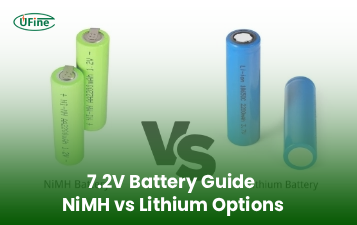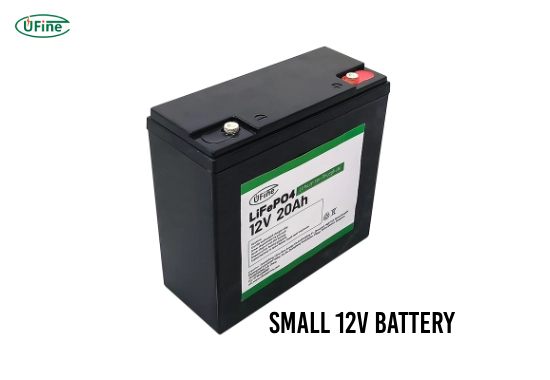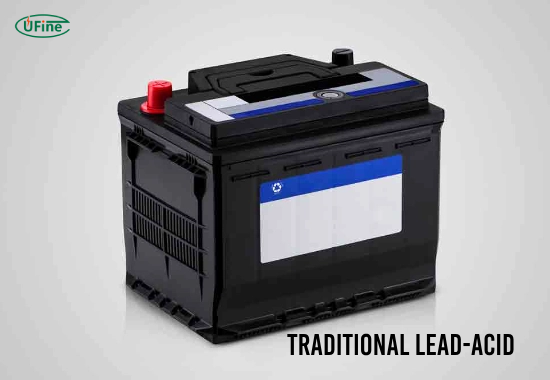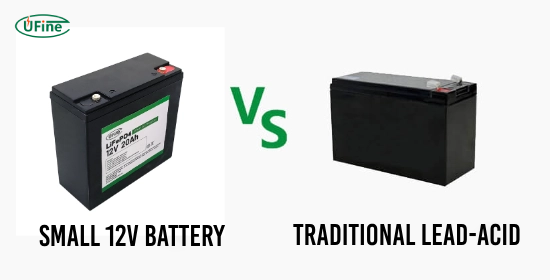
- Part 1. What is a small 12v battery and where is it used?
- Part 2. What is a traditional lead-acid battery and how does it work?
- Part 3. Summary table: Small 12V battery vs. lead-acid battery (Real Data)
- Part 4. Which battery is better for portable use: small 12v battery or lead-acid?
- Part 5. Which battery lasts longer: lithium 12v or lead-acid?
- Part 6. Which battery charges faster: lithium 12v or traditional lead-acid?
- Part 7. Which is safer: small 12v battery or traditional lead-acid?
- Part 8. How do small 12v batteries perform in cold weather?
- Part 9. Which battery is more eco-friendly and sustainable?
- Part 10. What is the actual cost and value of small 12v vs lead-acid batteries?
- Part 11. Which is better for solar power systems: small 12v lithium or lead-acid?
- Part 12. FAQs about small 12v battery and traditional lead-acid
- Part 13. Final Thoughts
What is the best battery for portable power: a small 12V battery or a traditional lead-acid battery? This is a question many RV users, solar enthusiasts, and outdoor adventurers ask when choosing a reliable power source.
Small 12V batteries, especially lithium-based ones, are changing the way we think about battery power. They are lighter, smarter, and often more powerful. Traditional lead-acid batteries are heavier and older in technology, but they are still widely used.
In this article, we will compare these two battery types in detail. You will learn everything you need to decide which one is better for your needs. We will explore weight, lifespan, charging time, cost, safety, and more. Let’s begin.
Part 1. What is a small 12v battery and where is it used?
A small 12V battery is a compact, rechargeable power source that delivers 12 volts of direct current. It is commonly made using lithium-ion or lithium iron phosphate (LiFePO₄) technology. These batteries are used in a wide range of portable applications such as:
- Solar panel systems
- Camping power stations
- Electric scooters
- Portable refrigerators
- CPAP machines
- Backup power for Wi-Fi routers and CCTV
The compact size, light weight, and high energy efficiency make small 12V batteries ideal for mobile and off-grid use.
Part 2. What is a traditional lead-acid battery and how does it work?
A traditional lead-acid battery is a type of rechargeable battery invented in the 1800s. It uses lead plates submerged in sulfuric acid to store and release electrical energy. These batteries are commonly used in:
- Cars and motorcycles
- Backup power systems
- Boats and marine applications
- Off-grid solar installations (in budget systems)
They are cheaper upfront but have several limitations. They are heavy, need regular maintenance, and have a shorter lifespan.
Part 3. Summary table: Small 12V battery vs. lead-acid battery (Real Data)
| Feature | Small 12V Lithium Battery (100Ah) | Traditional Lead-Acid Battery (100Ah) |
|---|---|---|
| Weight | 11.5 kg (25.3 lbs) | 29.5 kg (65 lbs) |
| Lifespan | 3000 to 5000 cycles | 300 to 500 cycles |
| Usable Capacity | 95% (95Ah) | 50% (50Ah) |
| Charging Time | 2 to 4 hours | 8 to 12 hours |
| Maintenance | None | Requires water top-up and cleaning |
| Depth of Discharge | Up to 100% | Limited to 50% to avoid damage |
| Self-Discharge Rate | 2% per month | 10% to 15% per month |
| Cost (Approx.) | $500 to $800 | $150 to $250 |
| Operating Temperature | -20°C to 60°C | -10°C to 50°C |
| Safety Features | Built-in BMS | Ventilation required |
Part 4. Which battery is better for portable use: small 12v battery or lead-acid?
When portability matters, the small 12V lithium battery is the clear winner. It weighs about half as much as a lead-acid battery of the same capacity. You can easily carry it in a backpack or mount it in a tight space.
For example, a 100Ah lithium battery weighs around 25 pounds. A similar lead-acid battery weighs over 60 pounds. This weight difference matters if you’re hiking, camping, or working in a mobile environment.
Part 5. Which battery lasts longer: lithium 12v or lead-acid?
Small 12V lithium batteries last much longer than lead-acid batteries. On average:
- Lithium batteries can last 3000 to 5000 cycles
- Lead-acid batteries last only 300 to 500 cycles
If you cycle your battery once a day, a lithium battery can last 8 to 10 years. A lead-acid battery may need replacement in just 1 to 2 years.
Over time, this longer lifespan makes lithium more cost-effective, even if the upfront price is higher.
Part 6. Which battery charges faster: lithium 12v or traditional lead-acid?
Lithium 12V batteries charge faster and more efficiently. They have a charge efficiency of over 95%. This means more of the energy goes into storage rather than being lost as heat.
- A lithium battery can charge from 0% to 100% in 2 to 4 hours
- A lead-acid battery takes 8 to 12 hours for a full charge
For off-grid solar systems, this is a big advantage. Shorter charge times allow you to make the most of limited sunlight.
Part 7. Which is safer: small 12v battery or traditional lead-acid?
Small 12V lithium batteries are safer and require no active maintenance. They come with built-in Battery Management Systems (BMS) to protect against:
- Overcharging
- Over-discharging
- Overheating
- Short circuits
Lead-acid batteries require proper ventilation and regular inspection. They can leak acid or release hydrogen gas during charging, which is a fire risk in enclosed areas.
Part 8. How do small 12v batteries perform in cold weather?
Lead-acid batteries perform slightly better in freezing temperatures, especially below -10°C. Lithium batteries may slow down or stop working if not designed for cold use.
However, many modern lithium batteries now include built-in heating systems or insulated designs. These allow them to work in sub-zero conditions with no performance loss.
Always check the manufacturer’s temperature ratings before buying a battery for winter use.
Part 9. Which battery is more eco-friendly and sustainable?
Small 12V lithium batteries have a smaller environmental footprint over their lifetime.
While lithium mining does have environmental costs, lithium batteries:
- Last longer
- Require fewer replacements
- Have higher energy efficiency
- Produce less electronic waste
Lead-acid batteries are recyclable, but many are not properly disposed of. They contain toxic lead and sulfuric acid, which can harm soil and water.
Part 10. What is the actual cost and value of small 12v vs lead-acid batteries?
Let’s compare the real-world cost and long-term value of both batteries:
| Feature | 100Ah Lithium Battery | 100Ah Lead-Aid Battery |
|---|---|---|
| Upfront Cost | $600 average | $180 average |
| Lifespan | 3000+ cycles | 400 cycles |
| Cost per Cycle | $0.20 | $0.45 |
| Usable Capacity | 95Ah | 50Ah |
| Replacement Frequency (10 Years) | Once | 3–4 times |
| Total 10-Year Cost | $600 | $540 to $720 (depends on replacements) |
Although lithium batteries cost more at first, they save money in the long run.
Part 11. Which is better for solar power systems: small 12v lithium or lead-acid?
Lithium 12V batteries are better for solar power applications due to their efficiency and depth of discharge. They can store more usable energy and charge quickly during daylight hours.
Lead-acid batteries, on the other hand, can only use about 50% of their capacity. They also lose more energy during charging and discharging.
If you have limited space or sunlight, lithium batteries help you get the most out of your solar panels.
Part 12. FAQs about small 12v battery and traditional lead-acid
Can I directly replace my lead-acid battery with a small 12V lithium battery?
Yes, but make sure the voltage and current match your existing system. You may also need a lithium-compatible charger.
Are small 12V lithium batteries safe for indoor use?
Yes. They do not emit gases and do not require ventilation. Just make sure they include a built-in BMS.
Do small 12V batteries need special chargers?
Some do. Using a charger designed for lithium batteries ensures safety and longer life.
How do I choose the right size small 12V battery?
Calculate your daily energy use in watt-hours. Divide that number by 12 to find the amp-hours (Ah) needed. Then choose a battery that matches or exceeds that number.
Are small 12V batteries worth the higher price?
Yes. They last longer, charge faster, are easier to carry, and provide more usable energy. This makes them a better investment over time.
Part 13. Final Thoughts
The choice between a small 12V battery and a traditional lead-acid battery depends on your needs. But for most portable and solar power applications, small 12V lithium batteries offer a better balance of performance, safety, and long-term value.
If you care about weight, lifespan, fast charging, and ease of use, lithium is the way to go.
Related Tags:
More Articles

NiMH vs Lithium 7.2V Battery and Charger: Which Is Better?
Compare 7.2V NiMH vs Lithium batteries and chargers in 2025. Learn runtime, weight, charging, lifespan, and cost to choose the best for your device.
How to Choose the Right 7.2V Battery and Charger for Your Device?
Learn how to choose the right 7.2V battery and charger for optimal performance, safety, and longevity across RC, tools, medical, and industrial devices.
Big Square Battery Safety Standards You Must Know
Learn key safety standards for big square batteries to avoid fire risks, shipping delays, and compliance issues in EV, industrial, and energy storage projects.
Big Square Battery Applications in Solar & Industrial Equipment
Big square batteries deliver high capacity, stable output, and long life for solar, industrial, and backup power. Explore key uses and advantages.
Big Square Battery vs Cylindrical Battery: Complete 2025 Guide for EVs, ESS & Industrial Devices
Choosing the right battery is key for designers and engineers. Compare big square vs cylindrical batteries to find the best fit for your application.





